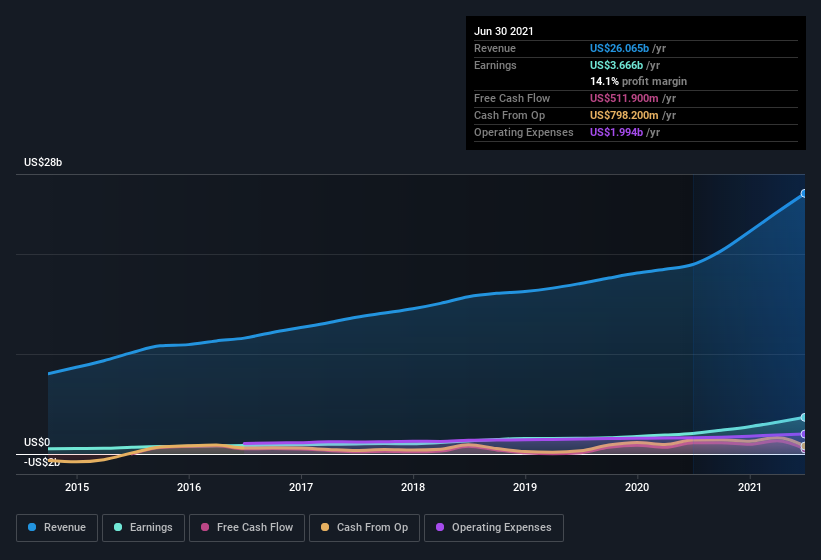- United States
- /
- Consumer Durables
- /
- NYSE:DHI
D.R. Horton's (NYSE:DHI) Solid Profits Have Weak Fundamentals
Unsurprisingly, D.R. Horton, Inc.'s (NYSE:DHI) stock price was strong on the back of its healthy earnings report. However, we think that shareholders may be missing some concerning details in the numbers.
See our latest analysis for D.R. Horton

A Closer Look At D.R. Horton's Earnings
Many investors haven't heard of the accrual ratio from cashflow, but it is actually a useful measure of how well a company's profit is backed up by free cash flow (FCF) during a given period. In plain english, this ratio subtracts FCF from net profit, and divides that number by the company's average operating assets over that period. The ratio shows us how much a company's profit exceeds its FCF.
That means a negative accrual ratio is a good thing, because it shows that the company is bringing in more free cash flow than its profit would suggest. While it's not a problem to have a positive accrual ratio, indicating a certain level of non-cash profits, a high accrual ratio is arguably a bad thing, because it indicates paper profits are not matched by cash flow. Notably, there is some academic evidence that suggests that a high accrual ratio is a bad sign for near-term profits, generally speaking.
D.R. Horton has an accrual ratio of 0.21 for the year to June 2021. We can therefore deduce that its free cash flow fell well short of covering its statutory profit. To wit, it produced free cash flow of US$512m during the period, falling well short of its reported profit of US$3.67b. D.R. Horton's free cash flow actually declined over the last year, but it may bounce back next year, since free cash flow is often more volatile than accounting profits.
That might leave you wondering what analysts are forecasting in terms of future profitability. Luckily, you can click here to see an interactive graph depicting future profitability, based on their estimates.
Our Take On D.R. Horton's Profit Performance
D.R. Horton didn't convert much of its profit to free cash flow in the last year, which some investors may consider rather suboptimal. Therefore, it seems possible to us that D.R. Horton's true underlying earnings power is actually less than its statutory profit. But the good news is that its EPS growth over the last three years has been very impressive. Of course, we've only just scratched the surface when it comes to analysing its earnings; one could also consider margins, forecast growth, and return on investment, among other factors. Keep in mind, when it comes to analysing a stock it's worth noting the risks involved. Case in point: We've spotted 2 warning signs for D.R. Horton you should be mindful of and 1 of them is potentially serious.
Today we've zoomed in on a single data point to better understand the nature of D.R. Horton's profit. But there is always more to discover if you are capable of focussing your mind on minutiae. For example, many people consider a high return on equity as an indication of favorable business economics, while others like to 'follow the money' and search out stocks that insiders are buying. While it might take a little research on your behalf, you may find this free collection of companies boasting high return on equity, or this list of stocks that insiders are buying to be useful.
If you’re looking to trade D.R. Horton, open an account with the lowest-cost* platform trusted by professionals, Interactive Brokers. Their clients from over 200 countries and territories trade stocks, options, futures, forex, bonds and funds worldwide from a single integrated account. Promoted
New: Manage All Your Stock Portfolios in One Place
We've created the ultimate portfolio companion for stock investors, and it's free.
• Connect an unlimited number of Portfolios and see your total in one currency
• Be alerted to new Warning Signs or Risks via email or mobile
• Track the Fair Value of your stocks
This article by Simply Wall St is general in nature. It does not constitute a recommendation to buy or sell any stock, and does not take account of your objectives, or your financial situation. We aim to bring you long-term focused analysis driven by fundamental data. Note that our analysis may not factor in the latest price-sensitive company announcements or qualitative material. Simply Wall St has no position in any stocks mentioned.
*Interactive Brokers Rated Lowest Cost Broker by StockBrokers.com Annual Online Review 2020
Have feedback on this article? Concerned about the content? Get in touch with us directly. Alternatively, email editorial-team (at) simplywallst.com.
About NYSE:DHI
D.R. Horton
Operates as a homebuilding company in East, North, Southeast, South Central, Southwest, and Northwest regions in the United States.
Excellent balance sheet average dividend payer.
Similar Companies
Market Insights
Community Narratives



